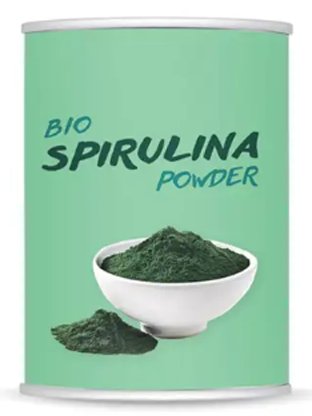Spirulina: Superfood
Spirulina is a nutrient-dense blue-green algae widely recognized as a superfood and a safe natural supplement. Rich in protein (65–70%), vitamins, minerals, and essential pigments like chlorophyll, xanthophyll, and phycocyanin, spirulina has gained global attention for its health benefits.
Scientific name: Arthrospira platensis.

Spirulina in Health and Wellness
Weight Loss and Appetite Control: Its phenylalanine amino acid is believed to send signals to the brain to suppress hunger, naturally reducing food intake and supporting weight management.
Acts as a galactagogue, boosting breast milk production.
Helps in blood sugar control.
Supports recovery from liver inflammation.
Health Benefits of Spirulina
Spirulina is one of the most nutrient-dense superfoods. It provides about 290 calories per 100 grams, while delivering a concentrated source of proteins, vitamins, and minerals.
It is low in sugars and fats but exceptionally high in essential micronutrients. Spirulina contains significant amounts of iron (356% RDA), magnesium (49% RDA), potassium (29% RDA), and calcium (12% RDA). It is also a rich source of vitamins like vitamin C, vitamin A, and B-complex groups.
Spirulina is a remarkable source of plant protein, offering nearly 57 g per 100 g, which covers more than 100% of daily protein needs. Moreover, its protein is highly digestible and bio-available.
Spirulina contains Vitamin A (570 IU, 19% RDA) and beta-carotene (342 µg), both essential for maintaining healthy vision, skin, and immune function. Regular consumption of vitamin A-rich foods is also linked with reduced risk of lung and oral cancers.
It is packed with several B-complex vitamins, including thiamin (198% RDA), riboflavin (283% RDA), niacin (80% RDA), pantothenic acid (70% RDA), vitamin B6 (28% RDA), and folate (24% RDA). These vitamins play a vital role in energy production, brain function, and prevention of birth defects.
Although lower than fresh vegetables, spirulina still provides 10.1 mg of vitamin C (17% RDA), a powerful antioxidant that supports immunity, collagen formation, and defense against free radicals.
Spirulina is cholesterol-free and contains healthy essential fatty acids, though in smaller amounts compared to marine algae. Its nutrient-dense profile makes it a valuable addition to vegetarian and vegan diets.
In addition to protiens and vitamins, spirulina also supplies important minerals like selenium (13% RDA) and phosphorus, which support antioxidant defense and bone health.
| Principle | Nutrient Value | Percent of RDA |
|---|---|---|
| Energy | 290 Kcal | — |
| Carbohydrates | 23.9 g | 18% |
| Protein | 57.5 g | 102% |
| Total Fat | 7.72 g | 26% |
| Cholesterol | 0 mg | 0% |
| Dietary Fiber | 3.6 g | 9% |
| Minerals | ||
| Calcium | 120 mg | 12% |
| Iron | 28.5 mg | 356% |
| Magnesium | 195 mg | 49% |
| Phosphorus | 118 mg | 17% |
| Potassium | 1360 mg | 29% |
| Sodium | 1050 mg | 70% |
| Selenium | 7.2 µg | 13% |
| Vitamins | ||
| Vitamin C | 10.1 mg | 17% |
| Thiamin (B1) | 2.38 mg | 198% |
| Riboflavin (B2) | 3.67 mg | 283% |
| Niacin (B3) | 12.8 mg | 80% |
| Pantothenic Acid (B5) | 3.48 mg | 70% |
| Vitamin B-6 | 0.364 mg | 28% |
| Folate, Total | 94 µg | 24% |
| Vitamin A | 570 IU | 19% |
| Vitamin K | 25.5 µg | 21% |
| Phytonutrients | ||
| Carotene, beta | 342 µg | — |
Spirulina Uses
Spirulina is mainly consumed as a dietary supplement rather than a food, unlike other seaweeds such as nori or kombu. In many developing countries, it has been effectively used to combat malnutrition. Remarkably, just 1 gram of spirulina can provide twice the daily vitamin A requirement of a child.
Its exceptionally high protein conversion efficiency makes it a valuable food supplement for growing children, while its mild taste allows it to be easily incorporated into regular meals.
Safety profile
Spirulina, being a freshwater cyanobacteria, has a unique nutrient profile compared to marine seaweeds. Unlike nori or kombu, it contains relatively lower levels of iodine and heavy metals, making it suitable for regular consumption, even for individuals with thyroid concerns.
Spirulina is instead valued for its exceptionally high protein content, vitamins (A, B-complex, C, and K), and minerals such as iron, magnesium, and potassium. Its moderate consumption offers a wide range of health benefits that are often difficult to obtain from other plant-based foods. (Medical disclaimer).
Read further on:
≺≺ Nori Seaweed Nutrition Facts.
≺≺ Wakame Seaweed Nutrition Facts.
≺≺ is your kid getting too much protein?
≺≺ Is Plant-Based Protein the Key to a Longer, Stronger Life?
≻≻- Back to Seaweeds from Spirulina. Visit here for an impressive list of seaweeds with complete illustrations of their nutrition facts and health benefits.
≻≻- Back to Home page.
Further reading (Links opens in new window):
Food and Agriculture Organization -A REVIEW ON CULTURE, PRODUCTION AND USE OF SPIRULINA AS FOOD FOR HUMANS AND FEEDS FOR DOMESTIC ANIMALS AND FISH .